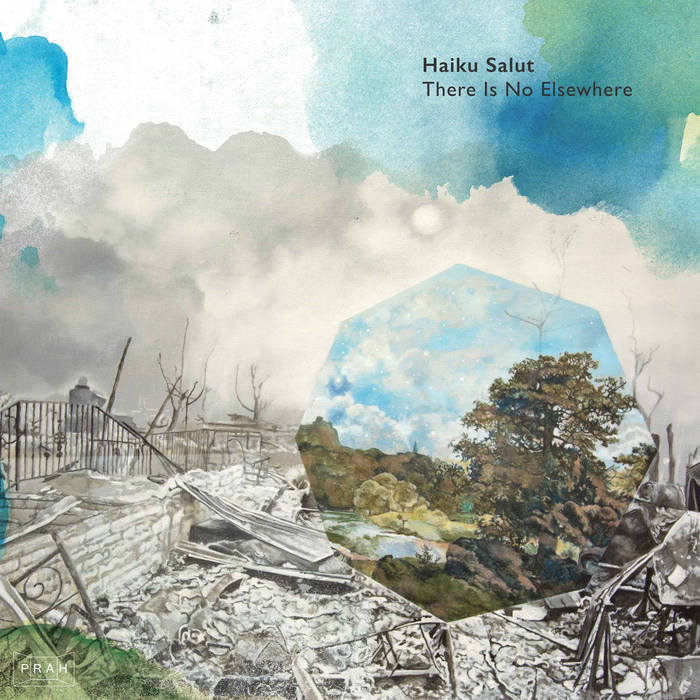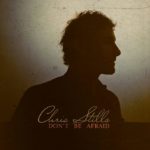Renowned for their spellbinding lamp shows, Haiku Salut’s third album There Is No Elsewhere (released by PRAH Records on 7 September) finds them, as usual, doing a lot of things, and doing them well. Their 2013 debut, Tricolore, was a brilliant, wayward delight, but undeniably prone to noodle along in places. The follow-up, Etch and Etch Deep, was a steelier affair, and pushed their folky aesthetic more firmly into the realms of the Folktronic dance-floor banger. Since then they’ve recorded with Jilk and Public Service Broadcasting, and in August performed alongside a self-playing Robot Orchestra, which is about the Haiku Salutiest thing that could ever happen. The band describe their sound as ‘loopery and laptoppery’, and onstage, behind banks of boffin-like electronic equipment, a seemingly never-ending supply of musical instruments gets passed from one band member to the next. It’s quite a spectacle, and the music that emerges occupies a startling and ambiguous aural space somewhere between the homespun and personable spontaneity of folk and the pre-programmed, haunted repetitions of a machine.
There Is No Elsewhere is music for turbulent times. The title could be in reference to the writings of dark ecologist Timothy Morton, and from the first track, ‘Cold to Crack the Stones’, it’s steeped in the Anthropocene. Mechanical chimes and skittering, percussive noises lead us towards the enveloping, lung-like exhalations of the Glastonbury Brass Band. It dies away for a moment until the drums start to pound and we’re borne along on a pitch-shifting synth motif that oscillates with all the joyous, fuck-you abandon of a dandelion that’s just knocked a hole in the pavement. The brass kicks back in at the end, because of course it does, and it all segues neatly into the smart little keyboard riff in the intro to the next track. Occupy is as sparkling a bit of synth-folk-trance-call-it-what-you-will as you ever heard. It’s the kind of stuff the Criminal Justice Bill was meant to put stop to in the early ’90s, only older, more self-aware and probably organising a sit-in to promote economic justice. The snowflakes are coming and they will crack those stones.
The Glastonbury Brass Band are back for ‘The More and Moreness’, the video of which casts the band as a gang of assassins sent deep into the countryside to blow up a mansion full of Cackling White Men In Suits™. More tellingly they also have a fantastic meal with their friends and a lovely drive in the country. It’s all about the togetherness. The inclusion of vocals here is a career first, although naturally the voice is filtered through something electronic and treated like any other sample. You still can’t call it a song, and nor should you want to, for that would undermine the rosy glow of community and inclusivity embodied in the mash-up of rave culture and brass band music. The artist Jeremy Deller got here first, but not with this kind of nonchalant facility. It’s ecstatic and elegiac, bucolic and urbane all at once.
The fun continues with the spooky, minimalist piano refrain of ‘Bow Wood’ and the chirpy, drum-machine antics enlivening ‘We Are All Matter’. But the real highlights are to come. ‘Choke Points’ evokes just enough of Philip Glass or the English landscape of Vaughan Williams before the kick of a drum and a big booming chord on the accordion signals a snaking, light-filled climax. In its sister track, ‘Nettles’, there’s something very Ghost Box Records lurking behind the sophisticated veneer, with synth breaks and wiggling bass conveying the merest suggestion of the title music of a disturbing and half-remembered ’70s children’s drama. Then with the flick of a major chord, the sinuous fullness we heard in ‘The More and Moreness’ returns, and they’re back, powering across a countryside newly strange, a landscape of crumbling bunkers, UFO encounters, secret research bases, cults, and maybe some unnamed something else – although the ancient evil breaking through seems pretty chill. Both unsettling and cosy, perhaps the ancient evil is actually here to help.
They bring back the spectral vocals for ‘I Am Who I Remind You Of’. Clocking in at seven minutes, there’s no reason it couldn’t be longer. There aren’t many current bands who make me nostalgic for the days of forty minute long CD singles by The Orb, but ‘I Am Who I Remind You Of’ seems to run through its repertoire of uncanny throbs, moans and tinkles all too quickly. As ever, it’s all in the percussion, in the gentle, unobtrusive stammering noises that suddenly coalesce into something apparently more purposeful, before melting under the hot breath of the accordion. It would be good to hear this in the foreground more often, but then, maybe we already have Boards of Canada.
The album closes with ‘Shadows’. It sounds like a music box lost in the woods, but which won’t give up, its breaks punctuated by ghostly sighs. A guitar slips in and out, almost unnoticeable under the trembling glockenspiel. It’s a haunted melody, the instruments imbued with the animated vibrations of living matter. A perfect closer, as it encapsulates the band’s ethos perfectly. They always put me in mind of what cheerful places our cities might be after humanity has gone, or of how living things can look like machines and how machines can look like organisms. Yet Haiku Salut never go for the easy thrills of menace, preferring something hopeful and forward-facing.
There Is No Elsewhere is a fully-realised and magical bit of music, and definitely one of my albums of the year. If they’re not headlining the Pyramid Stage with their mates in the local brass band pretty soon it will only be because our anthropocentric cognitive biases got in the way of recognising something really special. The rocks and the nettles will know.




